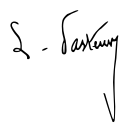Louis Pasteur
| Louis Pasteur | |
|---|---|

Photograph by Nadar
|
|
| Born |
December 27, 1822 Dole, France |
| Died | September 28, 1895 (aged 72) Marnes-la-Coquette, France |
| Nationality | French |
| Fields | |
| Institutions | |
| Alma mater |
École Normale Supérieure University of Paris |
| Notable students | Charles Friedel |
| Notable awards |
|
| Signature | |
Louis Pasteur (/ˈluːi pæˈstɜːr/, French: [lwi pastœʁ]; December 27, 1822 – September 28, 1895) was a French biologist microbiologist and chemist renowned for his discoveries of the principles of vaccination, microbial fermentation and pasteurization. He is remembered for his remarkable breakthroughs in the causes and prevention of diseases, and his discoveries have saved countless lives ever since. He reduced mortality from puerperal fever, and created the first vaccines for rabies and anthrax. His medical discoveries provided direct support for the germ theory of disease and its application in clinical medicine. He is best known to the general public for his invention of the technique of treating milk and wine to stop bacterial contamination, a process now called pasteurization. He is regarded as one of the three main founders of bacteriology, together with Ferdinand Cohn and Robert Koch, and is popularly known as the "father of microbiology".
...
Wikipedia

